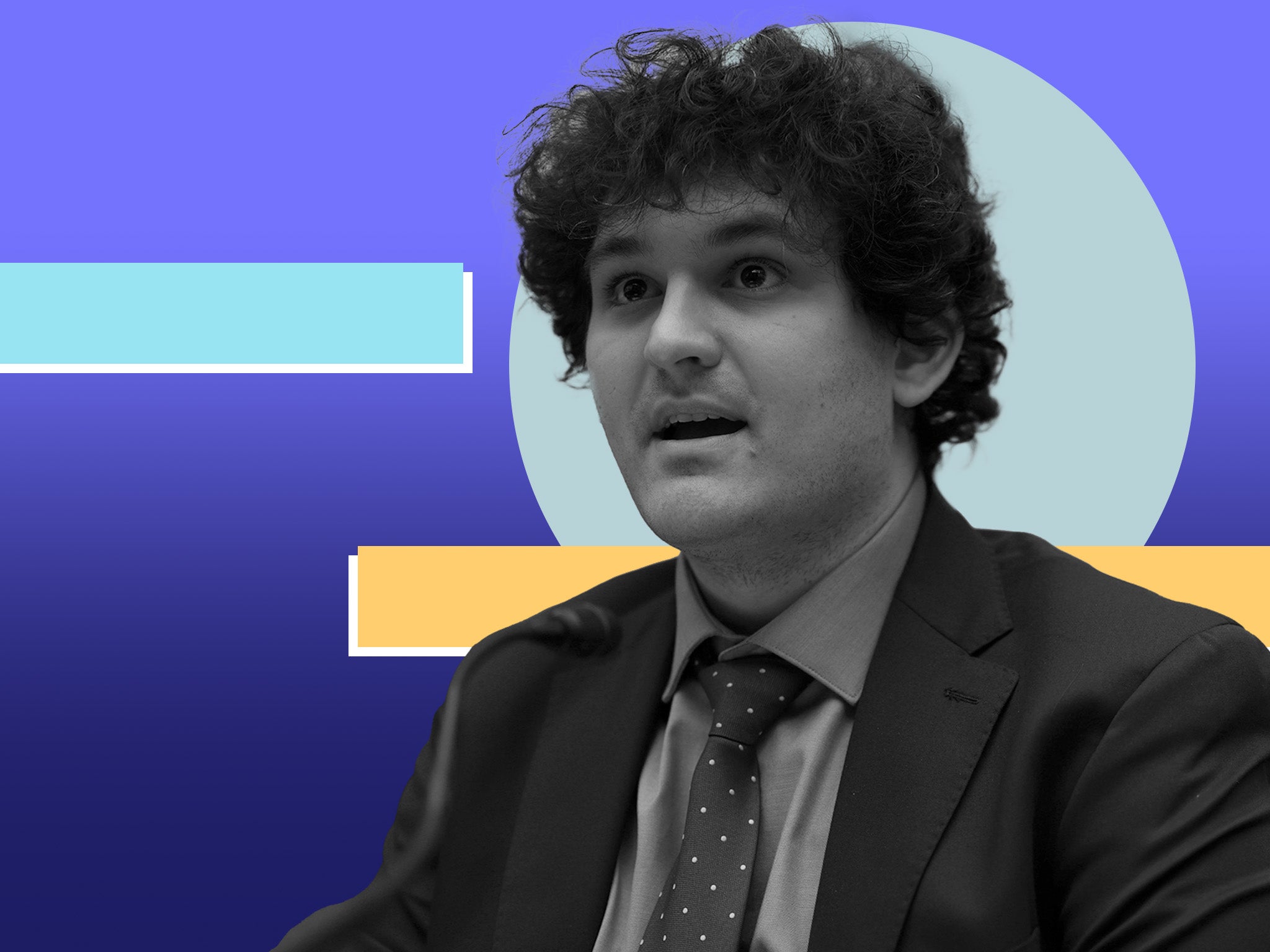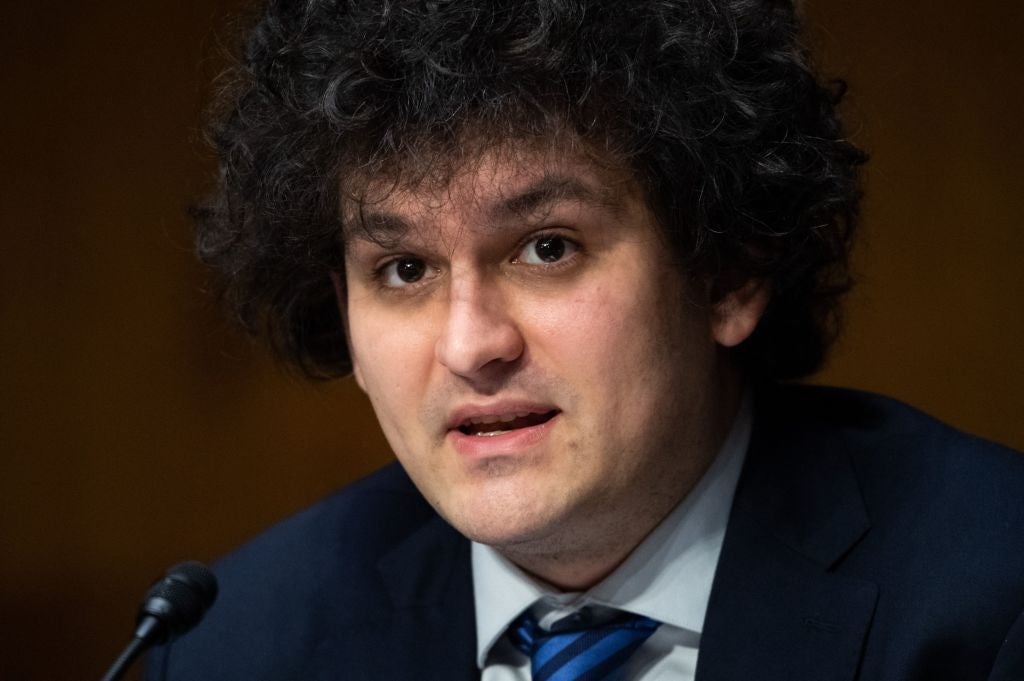The Independent's journalism is supported by our readers. When you purchase through links on our site, we may earn commission.
‘It all fell apart’: How a ‘crypto saviour’ lost $16bn in just one day
An “altruistic” cryptobillionaire who saw 90 per cent of his fortune wiped out in a single day has been charged with a host of financial crimes, in the process demolishing trust in digital currencies that could have an impact on the broader economy, writes Bevan Hurley


Late last year, Sam Bankman-Fried testified before Congress about why cryptocurrencies could never go the way of the large investment banks that capitulated in the global financial crisis of 2008.
“No one knew how much risk was in that system until it all fell apart,” the 30-year-old founder and chief executive of cryptocurrency exchange firm FTX said. “If you compare that with what happens on FTX or other major cryptocurrency venues today, there is complete transparency about… the positions that are held. There is a robust, consistent risk framework applied.”
In early November, Bankman-Fried had his own Lehman Brothers moment in a head-spinning turn of events that has shaken investor confidence in crypto, perhaps permanently.
Investors began fleeing the Bahama-based FTX after a larger, rival crypto exchange firm, Binance, raised concerns about its financial stability.
An estimated $6bn (£5.1bn) was drained from FTX’s books in three days.
The fears were amplified by Binance’s chief executive, Changpeng Zhao, in what Forbes claimed might have been an attempt to detract from the problems at his firm.
Binance then pledged to buy out the rival to stave off collapse, only to abruptly pull out of the deal. Binance accused FTX of mishandling customer funds and cited issues with corporate governance, wiping out 80 per cent of the value of FTX’s in-house crypto token.
The collapse sparked panic among crypto investors and saw the value of Bitcoin and Ether plunge by around 20 per cent in one day.

On 8 November, Bankman-Fried’s net worth plummeted from $16bn to under $980m, according to a Bloomberg wealth index.
Sequoia Capital, one of the fund’s largest investors, said in a letter it considered the $213m it held in FTX to be essentially worthless.
Other investors that had placed significant bets on FTX – including Canada’s third-largest pension fund, the Ontario Teachers’ Pension Plan – have also seen huge losses.
As much as $9bn in client funds vanished.
Bankman-Fried, who was hailed as a crypto saviour earlier this year when he helped shore up a number of companies that ran into financial trouble, issued an apology.
“I‘m sorry. That’s the biggest thing. I f***ed up, and should have done better,” he wrote on Twitter.
2) I also should have been communicating more very recently.
— SBF (@SBF_FTX) November 10, 2022
Transparently--my hands were tied during the duration of the possible Binance deal; I wasn't particularly allowed to say much publicly. But of course it's on me that we ended up there in the first place.
On 12 November, FTX Trading and Alameda were placed into bankruptcy in the Delaware courts and Bankman-Fried resigned as CEO.
Exactly one month later on 12 December, the Attorney-General’s office in The Bahamas announced it had taken Bankman-Fried-Fried into custody after receiving an extradition order from the US.
He has been charged with wire fraud, money laundering, violating campaign finance laws in eight count indictment by federal prosecutors in the Southern District of New York.
The disgraced crypto baron also face a host of civil charges from the Security and Trades Commission, and the Commodity Futures Trade Commission.
2022 has seen the demise of several crypto exchanges, including Celsius and Voyager, and tokens Luna and terraUSD, while the value of more established tokens such as Bitcoin and Ether has fallen along with other asset classes.
However, FTX was seen as one of the more stable currencies, and its deep-pocketed founder was feted by celebrities and politicians.
Bankman-Fried donated tens of millions to Democrats during the 2022 midterm cycle, while FTX bought naming rights to the Miami Heat’s basketball stadium.
Who is Sam Bankman-Fried?
Bankman-Fried was born and raised in the Bay Area in California, where both of his parents are law professors at Stanford Law School.
He graduated from the Massachusetts Institute of Technology with a physics degree before taking a job at Jane Street Capital and, as an adherent to “effective altruism”, began donating half of his income to charity.
He first rose to prominence after founding cryptocurrency trading firm Alameda Research in 2017 at the age of 25.
Bankman-Fried worked out how to exploit an unusual quirk in crypto values – that the price of Bitcoin was about 10 per cent higher in Japan than in the US.
He worked out a way of buying Bitcoin in the US and selling it in Japan at a time when digital assets were still eyed suspiciously as funding illegality on the dark web.

Alameda quickly became a major player in crypto and boasted of having more than $90m in digital assets while trading between $300m to $1bn daily.
Initially based in Berkeley, California, Bankman-Fried relocated to Hong Kong in 2018 after realising the looser regulatory environment would benefit profits.
He founded FTX in 2019 and relocated to the Bahamas in 2021.
Perennially dressed in shorts and sneakers, with unkempt locks and an awkward demeanour, Bankman-Fried befriended prime ministers, presidents and popstars.
In April, Bankman-Fried hosted the Crypto Bahamas conference, where he led an onstage panel featuring Bill Clinton and Tony Blair, a New York Times profile noted.
“Everywhere he went, crypto entrepreneurs offered handshakes and fist bumps, patting him on the back as they pitched projects or presented him with branded swag,” the New York Times wrote.
Despite having a net worth of $21.2bn, he continued to lead a frugal lifestyle, donating heavily to philanthropic causes, and pledged to donate his entire fortune to charity.

“Sam Bankman-Fried drives a Corolla, sleeps on a beanbag and has a Robin Hood-like philosophy,” a Bloomberg article said.
In February, FTX purchased a Super Bowl advertisement starring Larry David.
Attending the NFL’s marquee event in Los Angeles, Bankman-Fried befriended Tom Brady, Katy Perry and Orlando Bloom, the New York Times reported.
The decision to base himself in the Bahamas was at least in part driven by the island nation’s light regulatory touch.
According to the NYT, 80 per cent of its billion-dollar pre-meltdown revenue derived from a particularly risky form of investment where investors borrow money to bet on future increases in the value of crypto.
This form of investing – which can lead to enormous profits or losses – remains illegal in the US.
Bankman-Fried emerged as one of the most high-profile crypto champions in Washington DC and used his profile to lobby Congress to relax the rules around crypto trading.
Prior to FTX’s collapse, he had been trying to put together a $9.4bn rescue package to save FTX, according to a Reuters report.
Then, on 12 November, FTX Trading, Alameda Research and dozens of associated companies filed for bankruptcy in the Delaware courts and Bankman-Fried resigned as CEO.
FTX later said there had been “unauthorised access” and funds had disappeared. Hundreds of millions of dollars is believed to have vanished.
The Royal Bahamas Police Force announced it had launched a probe into FTX over the weekend to determine “if any criminal misconduct occurred”.
A ‘dramatic surprise ending’
It also emerged that Michael Lewis, the bestselling author of The Big Short and Moneyball is writing about Bankman-Fried and had spent the past six months embedded with him, The Ankler reported.
“Michael hasn’t written anything yet, but the story has become too big for us to wait,” his literary agent Michael Snyder wrote in a letter to publishers obtained by The Ankler.
The book would focus on the entrepreneur’s childhood, Wall Street career, embrace of effective altruism and “the creation of a crypto empire that catapulted him in record time into the ranks of the richest people in the world”.
“Of course, the events of the past week have provided a dramatic surprise ending to the story.”
Mr Lewis reportedly likened Bankman-Fried and Binance’s Zhao to Luke Skywalker and Darth Vader.
Elon Musk weighed in to the controversy on Twitter, revealing that he had rebuffed an offer from Bankman-Fried to invest in his acquisition of the social media platform.
The Internal Tech Emails Twitter account published leaked text messages between Musk and his banker Michael Grimes showed that Bankman-Fried offered “at least $3bn” to help fund the deal.
Accurate. He set off my bs detector, which is why I did not think he had $3B.
— Elon Musk (@elonmusk) November 12, 2022
Musk questioned whether the FTX founder had access to that amount.
Replying on Twitter, Musk said: “Accurate. He set off my bs detector, which is why I did not think he had $3B.”
The arrest and charges
Bankman-Fried was arrested in The Bahamas on 12 December after US authorities issued an extradition order.
Federal prosecutors in the US Southern District of New York said Bankman-Fried “willingly and knowingly” committed fraud on investors and customers in an unsealed indictment on Tuesday.
He has been charged with wire fraud, money laundering, violating campaign finance laws in eight count indictment.
The US Securities and Exchange Commission (SEC) earlier levelled him with civil charges of defrauding FTX investors and customers
The SEC said in a statement that he had “orchestrated a years-long fraud” at FTX where he diverted customer funds to Alameda Research and kept it hidden from investors.
“We allege that Sam Bankman-Fried built a house of cards on a foundation of deception while telling investors that it was one of the safest buildings in crypto,” said SEC Chair Gary Gensler in a statement.
What now for crypto?
According to a recent report from crypto news site Coindesk, the two parts of Bankman-Fried’s crypto empire, Alameda and FTX, had become “unusually close”.
Coindesk obtained a leaked balance sheet showing that Alameda’s value was built on a “foundation largely made up of a coin that a sister company invented”.
The Department of Justice and the Securities and Exchange Commission are now examining the relationship between both businesses for any possible wrongdoing, according to the Associated Press.
Investigators are focusing on whether FTX might have used investors’ deposits to fund bets at Alameda Research.
In traditional markets, brokers are expected to separate client funds from other company assets, AP notes.
FTX US, its US-based business, is only a small part of the larger FTX empire and is subject to regulation by lawmakers in Washington.
FTX US’s website was down and the company said it had halted trading “for a few days”.
Addressing the controversy in November, White House press secretary Karine Jean-Pierre said that the administration was closely monitoring developments.
“The administration has consistently maintained that, without proper oversight of cryptocurrencies, they risk harming everyday Americans,” Ms Jean-Pierre told reporters.
The price of Bitcoin, which is down 75 per cent from its all time high last November, rallied on the appearance of lower inflation data.
But the impact on the broader market is likely to be felt for some time, and some analysts predict it could lead to an exodus of large financial institutions that have embraced crypto.
“From a financial side, it’s fair to say that confidence is going to be somewhat shaken, because if you can’t trust FTX then what can you trust?” Yat Siu, co-founder of Hong Kong-based Animoca Brands, told Reuters.
Amid increasing scrutiny of other cryptocurrency exchanges, Singapore-based Crypto.com revealed it had accidentally transferred $400m of the Ether coin to a wrong account.
This led customers to withdraw their funds from the exchange and saw the price of its CRO token plummet 45 per cent, according to Coindesk.
Chief executive Kris Marszalek sought to reassure investors that its exposure to FTX was minimal in a live Q and A interview on its YouTube channel.
Join our commenting forum
Join thought-provoking conversations, follow other Independent readers and see their replies
Comments
Bookmark popover
Removed from bookmarks